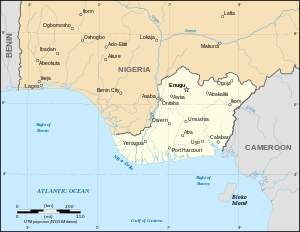Nigerian Civil War
| Nigerian Civil War | |||||||
|---|---|---|---|---|---|---|---|
 The independent state of the Republic of Biafra in June 1967 |
|||||||
|
|||||||
| Belligerents | |||||||
|
|
|
||||||
|
Supported by:
|
|||||||
| Commanders and leaders | |||||||
|
|
Taffy Williams |
||||||
| Strength | |||||||
|
85,000 - 150,000 (1967) (Possible 100,000) 250,000 (1968) 200,000 - 250,000 (1970) |
10,000 - 100,000 (1967) (Possible 30,000) 110,000 (1968) 50,000 - 100,000 (1970) |
||||||
| Casualties and losses | |||||||
|
Military killed: 45,000 - 100,000 killed Displaced: 2,000,000 - 4,500,000 Refugees: 500,000 - 3,000,000 |
|||||||
Nigerian victory
Military killed: 45,000 - 100,000 killed
Displaced: 2,000,000 - 4,500,000
The Nigerian Civil War, better known as the Biafran War, (6 July 1967 – 15 January 1970), was a war fought to counter the secession of Biafra from Nigeria. Biafra represented nationalist aspirations of the Igbo people, whose leadership felt they could no longer coexist with the Northern-dominated federal government. The conflict resulted from political, economic, ethnic, cultural and religious tensions which preceded Britain's formal decolonisation of Nigeria from 1960 to 1963. Immediate causes of the war in 1966 included a military coup, a counter-coup, and persecution of Igbo living in Northern Nigeria. Control over oil production in the Niger Delta played a vital strategic role.
Within a year, the Federal Military Government surrounded Biafra, capturing coastal oil facilities and the city of Port Harcourt. The blockade imposed during the ensuing stalemate led to severe famine—accomplished deliberately as a war strategy. Over the two and half years of the war, there were about 100,000 overall military casualties, while between 500,000 and 2 million Biafran civilians died from starvation.
This famine entered world awareness in mid-1968, when images of malnourished and starving children suddenly saturated the mass media of Western countries. The plight of the starving Biafrans became a cause célèbre in foreign countries, enabling a significant rise in the funding and prominence of international non-governmental organisations (NGOs). Britain and the Soviet Union were the main backers of the Federal Military Government in Lagos, while France and some independent elements supported Biafra. France and Israel provided weapons to both combatants.
...
Wikipedia
